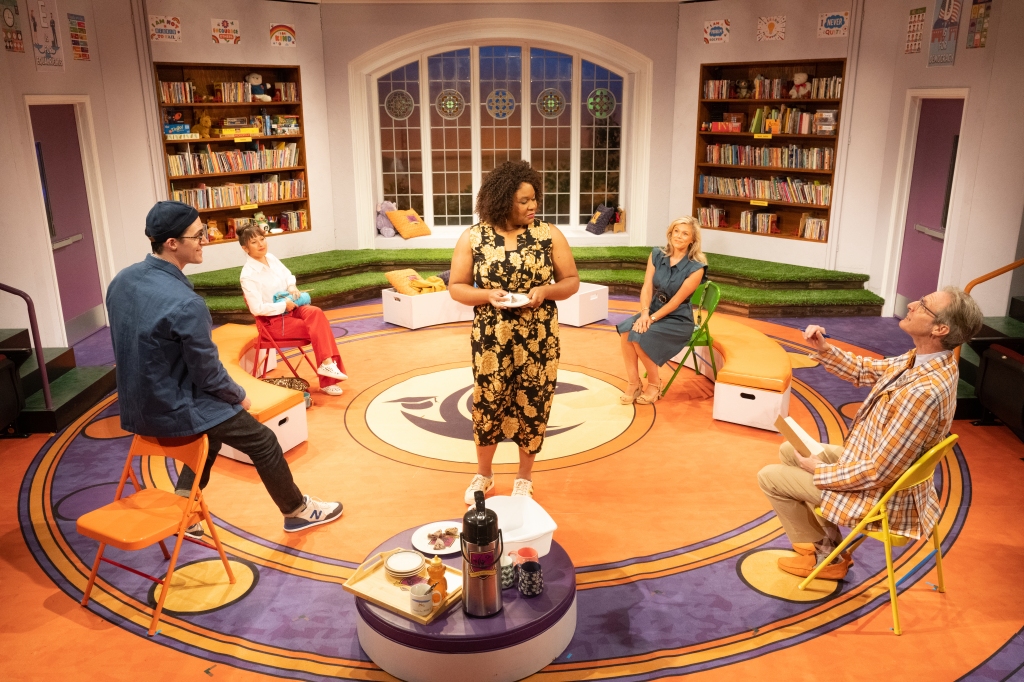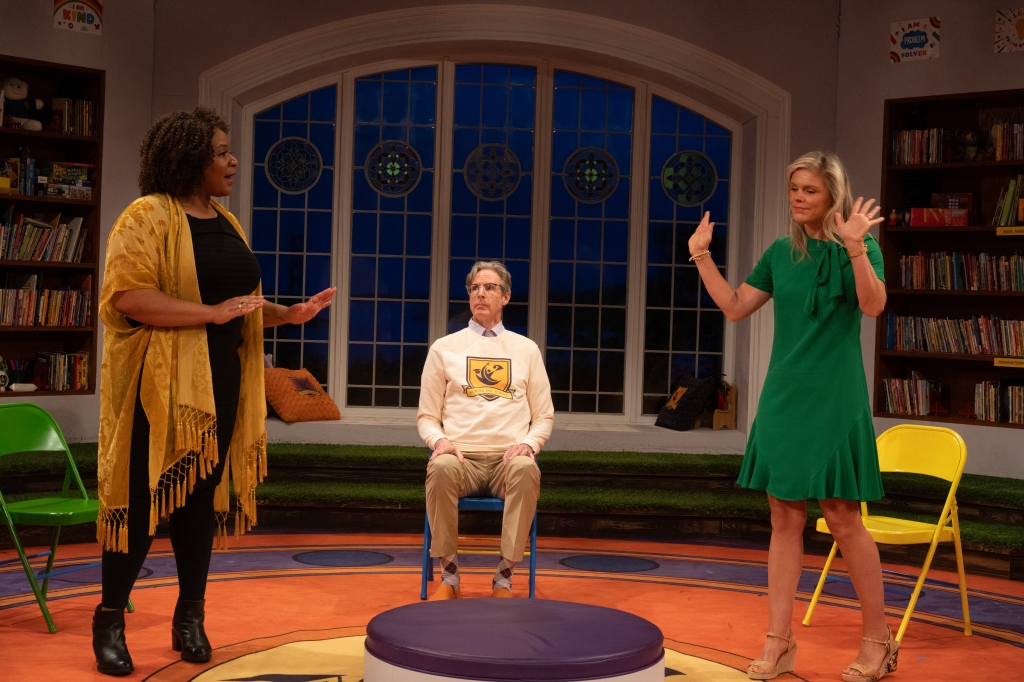As you walk into the Cook Theater to watch the Asolo Repertory Theatre’s new play “Eureka Day,” you feel as if you have crossed the threshold into a post-racial utopian world that values equity, justice, rainbows, and sunshine. The entire theater, plastered with life affirming and motivational posters, is a visual masterpiece setting the scene of a progressive private school. Throughout the nearly two-hour play, we watch the days pass through sunrises and sunsets against the San Francisco bridge as the school’s executive board and principal meet collaboratively to set the tone for the education they desire for their privileged children.
Paul Slade Smith as Don, the Eureka Day principal, is a well-coiffed Mr. Rogers-esque leader whose bright bowties match his orange suede shoes. Don is the linchpin holding his community and the play together. I hope we see more of Smith, who hails from Broadway and is making his Asolo debut. He is the most flamboyant of the characters and is a true believer – making every effort to live his values while keeping the lights on in his school. I’ve attended more than my share of meetings like the ones that Don leads where everyone expects to be heard and validated as they seek consensus amid Don’s hilarious recitations by the poet Rumi. Despite the committee’s best intentions, however, the parents’ egos invariably become inflamed.
The committee includes founder Suzanne, played to perky, prim perfection by Anne Bowles, underneath whose welcoming demeanor lies her sinister desire to control the proceedings and maintain decorum. She is joined by long-standing committee members, the stylish and seemingly apathetic Meiko (Celia Mei Rubin) who seems more engaged with her knitting than setting the agenda, and Eli (Chris Amos) who has an immense fondness for skull caps and hearing himself talk. New to the board is Karina (Jasmine Bracey), who occupies the rotating seat for the parent of a new student. The group tries to include her as they debate the relative merits of adding the category transracial adoptee to the drop-down menu for incoming students, but she clearly is more amused than concerned about the relatively innocuous discussion. The committee is an exercise in virtue signaling, and the cast plays it straight while letting us in on the humor as the parents wade in the weeds of school policies. What I most wanted to know was what the local baker, a reformed felon, put in the committee’s scones of choice – I still can’t stop thinking about the sixth character on stage – the alluring baked good!

As the play progresses, Don delivers the disturbing news that Department of Health has at least one reported case of the mumps in the community and has required that they inform the parents that students who have not been vaccinated are at risk. It’s as if Don’s thrown a hand grenade into the meeting and sat by watching it burn. Two of the members, Suzanne and Meiko are vehemently opposed to vaccinations, and Suzanne goes into full panic mode as she feels that the values of her beloved school have been thrown into sharp relief. She took for granted that at a private school, she could avoid vaccinating her children, but the public health emergency puts the entire school in an uproar.

Act One ends with a hilarious scene involving Don leading an online discussion with the support of his committee. Above the actors on large screens, the all too familiar chat session, ubiquitous during our COVID-era, dissolves into pure chaos as parents argue vehemently over the science behind vaccination and quarantine. It was cathartic to be able to laugh at something that a year ago was one of the most difficult periods for parents since the polio epidemic. New College graduate Jonathan Spector wrote a masterful and prescient script before the COVID pandemic, which speaks to the very human desire to control nature. In retrospect, it seems entirely predictable that people, particularly Americans, would clash over a debate between individual rights and a communitarian push to ensure the safety of others.
The discourse during the more somber Act Two helped to humanize both sides of the vaccine divide that has dominated the news, local school board meetings, family dinners, and workplaces for the past two years. Spector forces the audience to listen to the point of view of each of the parents without immediately going to our respective corners and piling on, which was depicted so brilliantly at the close of Act One. Everything slowed down in Act Two and for awhile it seemed like the parents might find a way to meet in the middle. For people who seemed to place such a high value on consensus, it was painful to watch the dark turn that the committee takes when the issue becomes so polarizing and so dire for its members. Perhaps this might help to explain our heated politics – a crisis can either bring people together or cause an irrevocable rift. For now, we seem to be unable to patch ourselves back together.

Spector is a modern-day Nostradamus who saw a potential for social strife in the controversial world of vaccines. Kudos to Michael Donald Edwards for bringing us this thoughtful play to help us make sense of the era through which we are living. Edwards has had his finger on the pulse of our community; and I hope through the shows in the coming seasons, we can continue to look to the Asolo to help us navigate the contours of our fraying democracy.
Check out the hilarious and thoughtful “Eureka Day” through June 4th at the Cook Theatre.